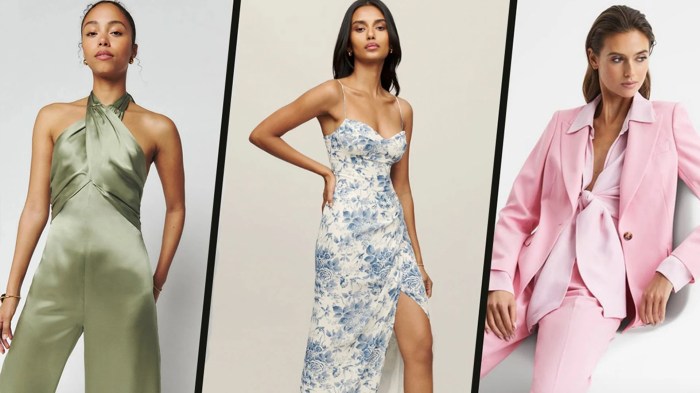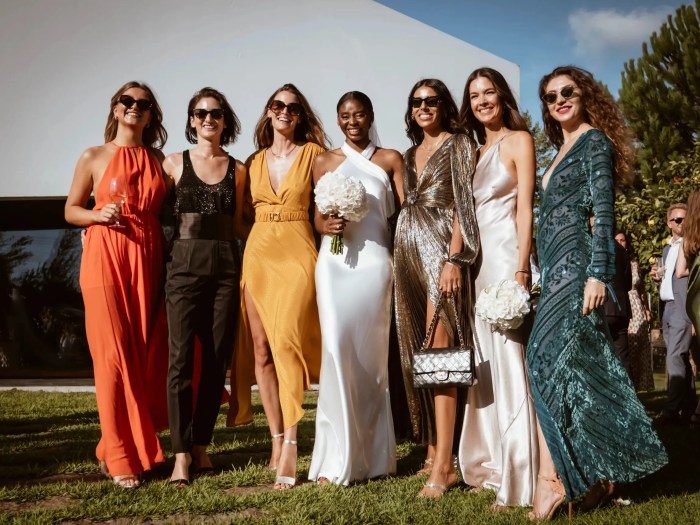Wedding Guest Dress Styles: A Comprehensive Guide: Dress Styles For Wedding Guests
Dress styles for wedding guests – Choosing the perfect outfit for a wedding can be a delightful yet challenging task. This guide provides a comprehensive overview of dress styles, helping you select an appropriate and stylish ensemble for any wedding occasion. We’ll cover dress codes, body types, fabrics, colors, accessories, and sustainable choices.
Wedding Dress Codes and Appropriateness, Dress styles for wedding guests
Understanding the dress code is paramount. Different codes dictate varying levels of formality. A black-tie wedding demands elegance, while a casual wedding allows for more relaxed attire. Less formal codes, like “festive attire” or “semi-formal,” require careful interpretation, often suggesting a balance between dressy and casual. The venue also significantly influences attire choices; a beach wedding calls for lighter fabrics and styles than a ballroom event.
| Venue | Dress Code | Appropriate Styles | Inappropriate Styles |
|---|---|---|---|
| Beach | Casual | Sundresses, maxi dresses, linen pantsuits | Formal gowns, ballgowns, overly elaborate jewelry |
| Garden | Semi-formal | Midi dresses, cocktail dresses, jumpsuits | Jeans, t-shirts, sneakers |
| Ballroom | Black-tie | Floor-length gowns, elegant jumpsuits, tuxedos | Casual dresses, shorts, sandals |
| Restaurant | Cocktail | Cocktail dresses, dressy pantsuits, stylish separates | Jeans, sneakers, overly casual tops |
Flattering Dress Styles by Body Type

Source: raisinglobal.com
Choosing a dress that flatters your body type enhances your confidence and overall appearance. Different styles accentuate various features, creating a silhouette that feels both comfortable and stylish. While body type recommendations are helpful, personal preference remains crucial.
- Hourglass: Wrap dresses, A-line dresses, fit-and-flare dresses. These styles emphasize the waistline.
- Pear: A-line dresses, empire waist dresses, fit-and-flare dresses. These balance the hips and waist.
- Apple: Empire waist dresses, V-neck dresses, A-line dresses. These draw attention upwards and away from the midsection.
- Rectangle: Wrap dresses, belted dresses, dresses with ruffles or details at the waist. These create curves and definition.
Fabric and Seasonality

Source: hellomagazine.com
Fabric selection significantly impacts comfort and style. Lightweight fabrics like cotton and linen are ideal for warm weather, while heavier fabrics such as velvet or brocade are better suited for cooler temperatures. The fabric also influences the overall look and feel of the dress.
| Fabric | Suitable Season | Dress Style Examples |
|---|---|---|
| Cotton | Spring/Summer | Sundresses, casual midi dresses |
| Linen | Spring/Summer | Maxi dresses, pantsuits |
| Silk | Spring/Autumn | Slip dresses, elegant gowns |
| Velvet | Autumn/Winter | Cocktail dresses, formal gowns |
Color and Pattern Considerations
Color choices should complement both your skin tone and the wedding’s theme and season. Pastels are generally suitable for spring and summer weddings, while richer jewel tones work well for autumn and winter. Patterns can add visual interest, but avoid anything too overpowering or distracting.
For example, a navy blue dress with a subtle floral print would be appropriate for a spring wedding, while a burgundy dress with a geometric pattern could be suitable for an autumn wedding. A light pink dress with minimal embellishment is ideal for a summer wedding.
Accessories and Footwear
Accessories and footwear complete the look. Jewelry, handbags, and hats should complement the dress style and the overall formality of the event. Footwear should be comfortable and appropriate for the venue. For instance, heels might be suitable for a ballroom wedding, but wedges or flats are better choices for a beach or garden setting.
- Cocktail Dress: Delicate necklace, small clutch, elegant heels.
- Maxi Dress: Statement earrings, woven bag, sandals or wedges.
- Sundress: Simple jewelry, straw tote, flats or espadrilles.
Ethical and Sustainable Choices

Source: vogue.com
Increasingly, consumers prioritize ethical and sustainable fashion choices. Consider brands committed to fair labor practices and environmentally friendly production methods. Opting for natural fabrics like organic cotton or linen reduces the environmental impact compared to synthetic materials. Supporting brands with transparent supply chains contributes to a more responsible fashion industry.
General Inquiries
Can I wear a jumpsuit to a wedding?
Jumpsuits are perfectly acceptable for many weddings, especially those with less formal dress codes. Choose a sophisticated style in an appropriate fabric and color.
What if the invitation doesn’t specify a dress code?
If the invitation lacks a dress code, it’s best to err on the side of semi-formal. A cocktail dress or a stylish pantsuit are generally safe choices.
Is it okay to wear white to a wedding?
Generally, it’s best to avoid wearing white to a wedding, as it’s traditionally reserved for the bride. Exception might be made for a very casual daytime wedding with a specific color theme that includes white.
How important is the length of my dress?
Dress length depends largely on the formality of the wedding and venue. Floor-length gowns are typically suitable for formal events, while knee-length or midi dresses are appropriate for less formal occasions.
